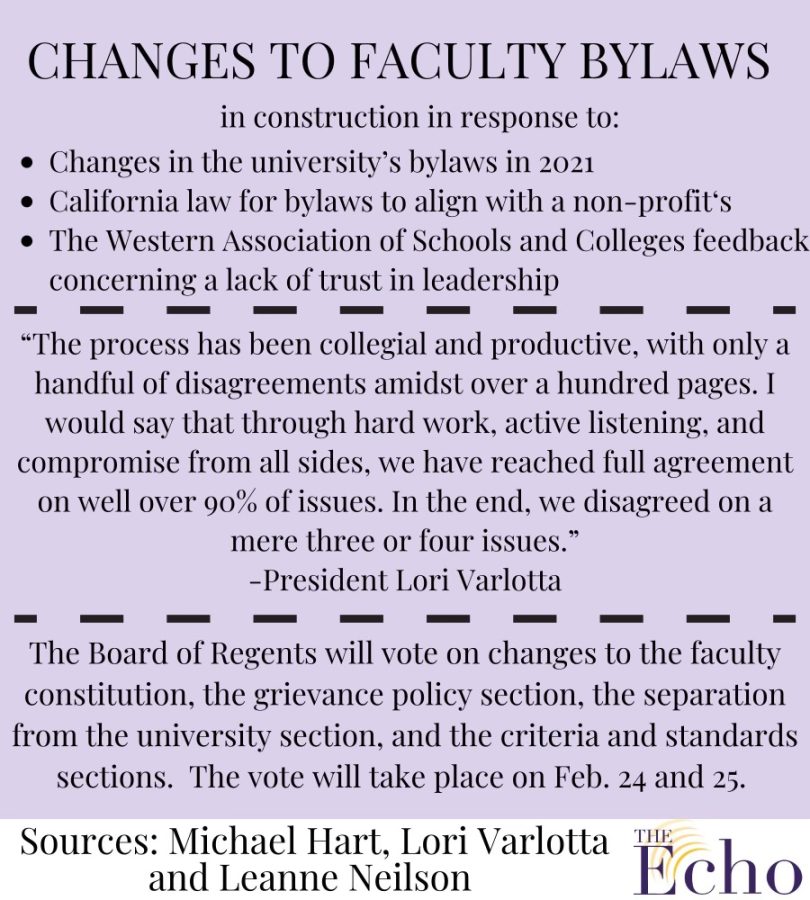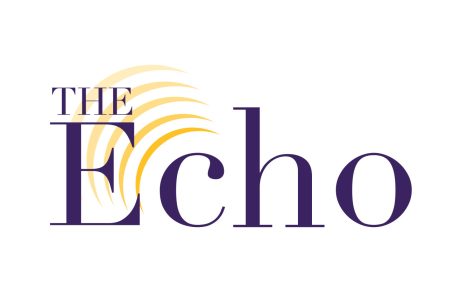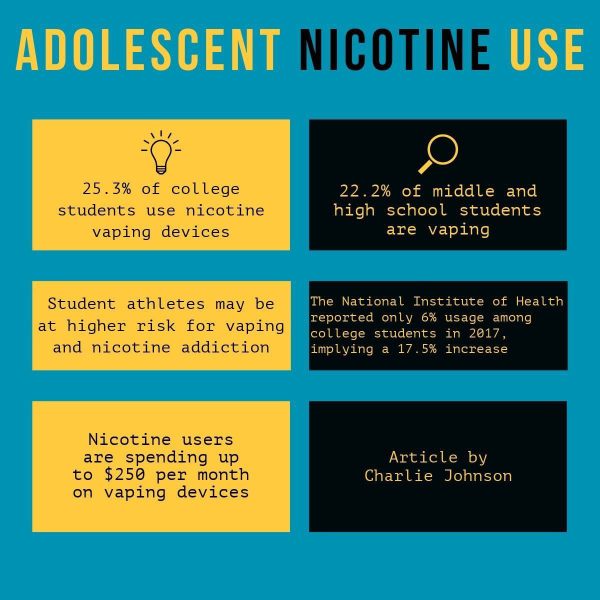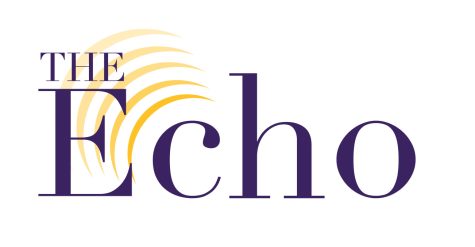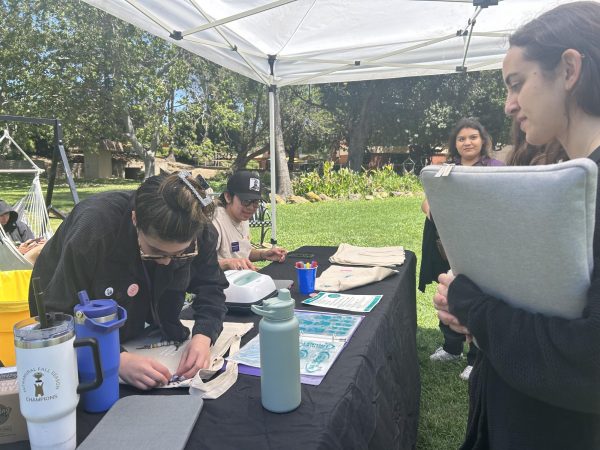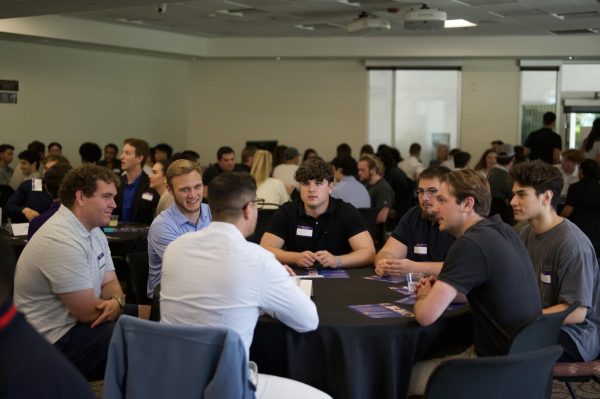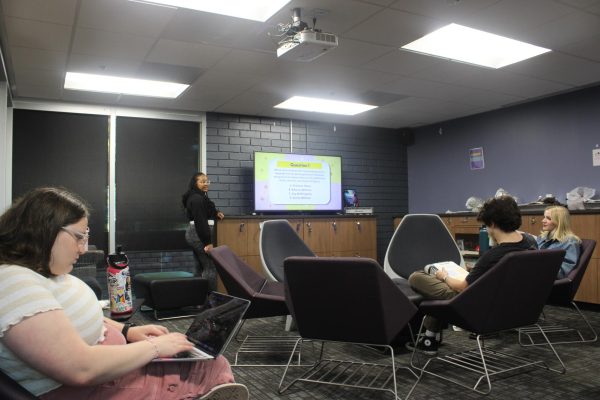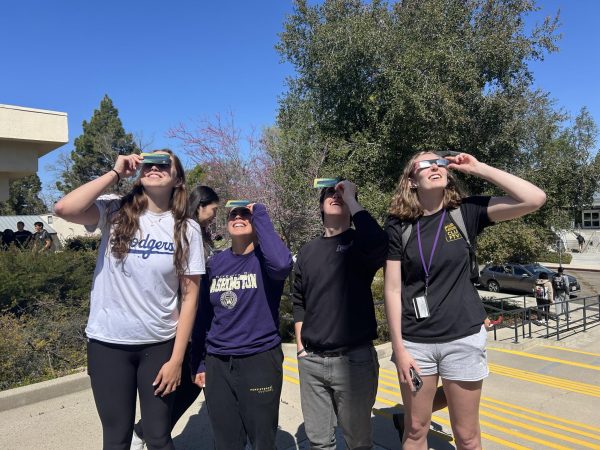Changes to faculty handbook, faculty raise concerns about process
February 25, 2023
Following the amendment of the university’s bylaws in May 2021, the Board of Regents asked faculty and administration to revise the faculty bylaws and constitution to align other documents with California Lutheran University’s new bylaws and its governing documents. The decision to revise the documents was also in accordance with California law, which states all documents must align with a nonprofit’s bylaws. These revisions come at a time when a lack of trust in senior leadership was identified as a concern for the university.
Chair of Faculty Senate Michael Hart said in a Zoom interview that when The Western Association of Schools and Colleges was at the university Sept. 7-9, 2022, they pointed out a lack of trust in senior leadership. He said that there is “more sort of conflict” happening between faculty and administration and with these changes that the administration is bringing forward.
“There’s been a distinctive shift in the relationship between faculty and administration. I think, previously, faculty had more of a say in how the university was run for decades,” Hart said. “And now what we’ve seen as is restructuring, which is much more hierarchical, and it’s changed our relationship.”
Sheridan Wigginton, the Humanities Division senator in the Faculty Senate, said the accrediting body explicitly articulated that many of the structural hurdles and tensions on campus cannot be resolved until this trust issue between faculty and administration is resolved.
“I think in the conversations about changes to the handbook and the Constitution as a senator, the conversations that I’m having with faculty members of my division don’t reflect improvement on this trust issue, given how this process has gone,” Wigginton said.
Ryan Medders, communication professor, who served as the faculty representative from June 2021 until November 2022, said in a Zoom interview that starting July 2022, faculty received revisions from the administration. Medders said that although these revisions were expected, the scope of the revisions was not what faculty expected.
“We expected that whatever we submitted, we would then be negotiating on those terms on those things,” Medders said. “Instead, we got, gosh, 100 plus pages of revisions on the entire documents.”
Medders said it was a surprise to find out that the administration had gone back to the original documents and did its own review.
“My ultimate hope, then, is that we can overcome some of these disagreements and that we move forward together,” Medders said. “That takes a lot of work, that takes good conversation and it takes having processes that are clearly laid out and explained and followed.”
Concerns by faculty about the revision process
Emma Hooper, former secretary of the Faculty Senate Executive Committee, said in a Zoom interview that a disagreement has been surrounding the timeline of these changes and revisions. She said that at times faculty felt rushed and there were requests for extensions.
Hart said he has “both substantive and process concerns.” He said he thinks certain things have moved so quickly that fairness and proper vetting haven’t taken place.
According to Medders, President Lori Varlotta had said in Senate meetings and other meetings that the board wanted this done and to move forward.
Vice Chair of the Faculty Senate Executive Committee Mike Gagliardo said in a Zoom interview one of the differences between faculty and administration in relation to the appointment, rank and tenure process was about how faculty were going to be evaluated.
According to the Faculty Policies Handbook, the authority of hiring and retaining faculty belongs to the president. A committee of elected faculty review full-time faculty and make recommendations to the university for the purpose of tenure and promotion.
As for tenure, the faculty handbook says “Tenure is the decision on the part of the University’s Board of Regents to enter a long-term professional relationship with an eligible faculty member who meets the standards for tenure set forth herein.”
Tenure is not just based on rank and time spent, but the quality of such and acceptance of a “career-long commitment to the University’s mission and its values, educational goals, and objectives.”
The language of these criteria for appointment, rank and tenure are among some of the areas being revised in the faculty handbook.
“Faculty feel we are in a better position to understand how we should evaluate ourselves, but admin wanted another certain language in there,” Gagliardo said.
He also said that because of the language proposed and included by administrators, there were concerns about if the language is measurable.
Gagliardo said the changes to the faculty handbook affect faculty more than students, but since faculty are a large part of the student experience, the changes have more indirect consequences on students.
“One of the things about CLU is many faculty love being here. They go above and beyond sort of what is requested and required of them,” Gagliardo said. “Partly we do that because we feel like we have input and say into a lot of different areas on campus. So, sort of as faculty get pushed away from that, they may not feel the same desire to engage above and beyond.”
Wigginton said faculty are a big part of the student experience since they see students every day and spend hours advising, mentoring and emailing students.
“So, the idea that you have a faculty body whose energy and focus is being pulled away from the student-centered nature of our jobs, of course, it impacted the faculty-student experience,” Wigginton said.
Gagliardo said faculty have had this experience where their voice was “sort of diminished,” especially with the removal of the faculty regent in the Board of Regents in October 2021. The faculty and student regents were replaced with representatives who no longer have a vote with the Board of Regents. He said the administration will ask faculty their opinion on matters but doesn’t always listen, which is within their right.
“It’s definitely frustrating to feel like being sort of being pushed out in certain areas that we previously had input or say in,” Gagliardo said.
For Wigginton, she said that the feedback from faculty, when rejected and mischaracterized, is the piece that is most disheartening for her.
“Because we have faculty that are giving their all not only in the classroom, not only in the professional field of publishing, not only in service, but that additional larger service to find time to give that energy and that critical feedback to move things forward and for it to not be valued,” Wigginton said.
She said it’s not that the feedback is not valued and done, but it’s a bit of infantilization of faculty by mischaracterizing the issue, that faculty are mad or upset because they simply didn’t get what they wanted.
“One of faculty’s greatest gifts is a critical lens that we’ve been trained to do, that’s what we trained our students to do,” Wigginton said. “So, when presented with a proposal, you should go into that relationship and into that negotiation thinking I’m going to get critical feedback.”
Wigginton said that critical feedback signals how engaged faculty are and should help lead faculty and administration to a better outcome. However, she said, in her experience, she doesn’t see that reception happening consistently to faculty feedback.
Dru Pagliassotti, the co-chair of the separation and grievance taskforce that was to revise and propose changes to the separation and grievance sections of the faculty handbook, said in a Zoom interview there is some concern about what is meant by shared governance. They said they think that faculty are partly reacting to what extent their expertise in areas is relevant to allow faculty to make an important decision, opposed to a non-faculty member.
“Because we kind of think of shared governance in which, as a model, in which people have some equality different interest groups can speak equally,” Pagliassotti said. “But that isn’t necessarily the way it ends up, turning out maybe that instead, different groups can advise, right, but don’t actually have the power to make the decision or aren’t given the power to make the decision.”
Hart said that faculty and administration agree with the vast majority of certain items, but there are significant differences in certain areas.
“At the end of the day, faculty still really care about students and care about the university and want it to be successful, so a lot of these are concerns and our voices are sort of rooted in those values,” Hart said.
Hooper said that she thinks there is a different perspective on how changes should be made.
“Faculty are interested in being very intentional, slowly having various built-in processes for feedback,” Hooper said. “We want to make sure that the changes we are making are well thought out and everyone has the opportunity to provide kind of feedback, input and perspective.”
Hooper said she thinks a lot of the changes are good and have involved a lot of faculty input, such as during the revision of the appointment, rank and tenure section of the faculty handbook. She said some of the changes were made for the better, like streamlining processes and making them clearer as well as updating items of the handbook that needed to be updated.
“So a lot of it has been really good. I think there is just some anxiety around certain pieces, related to academic freedom and faculty ability to make decisions that affect teaching and shared governance, things like that,” Hooper said.
Proposed changes to the Constitution
President Lori Varlotta said in an email interview that the process included collaborative efforts from faculty and administrators for more than a year.
“We want the outcome to emerge from a process shaped by the University values we have talked about for over two years: grace, generosity, inclusion and service,” Varlotta said.
Varlotta said some of the proposed changes to the constitution are to include the university’s mission statement and its definition of shared governance. Additionally, she said other changes include aligning the duties of the administration to the bylaws.
“The faculty who served on the various handbook committees worked hard and contributed weightily to the changes being brought forward. I appreciate their hard work,” Varlotta said.
She said she reviewed proposals from faculty as well as Provost Leanne Neilson and General Counsel Thomas Knudsen and used the proposals to decide what best aids in achieving Cal Lutheran’s mission and its priority to serve students before sharing these to the Board of Regents, who decide to accept, reject or alter these changes.
“The process has been collegial and productive, with only a handful of disagreements amidst over a hundred pages,” Varlotta said. “I would say that through hard work, active listening, and compromise from all sides, we have reached full agreement on well over 90% of issues. In the end, we disagreed on a mere three or four issues.”
Hart said the current batch of revisions has come about because of “various and different issues, events, factors and people that have coalesced.” He said faculty and administration identified some areas that need to be changed, such as the grievance and separation sections. On both sides, Hart said, there have been consultants assessing what the handbook should say.
“We had a consultant come in, who looked at these components, and made a number of recommendations,” Hart said. “He said that the previous process was a little too convoluted and kind of hard to follow. And that it conflated a grievance and the separation.”
According to Hart, this consultant was from the American Association of University Professors, which is faculty’s professional organization, and had the job of coming up with the best practices for the faculty handbook based on AAUP’s guidelines.
“It seems sort of mundane at times. You want it to be thorough and vetted because when you need it, when things go wrong, you’re glad it’s there and you’re glad it’s so detailed,” Hart said.
Knudsen, who was involved with the Faculty Handbook taskforce to review the separation and grievance sections, said in an email interview that his role was to ensure that the handbook coincides with other policies set by the institution, such as its bylaws. Knudsen was recently named as general counsel for Pepperdine University and will be leaving Cal Lutheran in March.
“The Faculty Handbook should also comport with educational best practices, and, as importantly, reflect who we are as an institution and community,” Knudsen said.
Grievance and separation task force
Pagliassotti said the task force’s goals include separating grievances and dismissal and making the policies more straightforward to address things that hadn’t been addressed. Another goal, according to Pagliassotti, was deciding on what is a grievance and what complaints will trigger an informal or formal grievance, which will require a committee to decide, opposed to complaints that should be handled differently.
“But then there’s just complaints like you aren’t happy with the time that your department chair schedules your classes. Should the Grievance Committee address, right? We decided no,” Pagliassotti said. “We decided that really needs to be taken care of in a different format.”
They said this was one of the reasons Knudsen was involved. Pagliassotti said Knudsen aided in making sure the standards of evidence complied with state or federal law and what standards the evidence needed to meet.
“We professors are not trained on that,” Pagliassotti said. “So that’s where having that, you know, a lawyer’s point of view helped a lot.”
Neilson, who worked with the Faculty Handbook taskforce, said in an email interview, faculty and administration “were in total agreement on the Grievance Policy section” and only have two disagreements in the separation from the university section. Additionally, Neilson said faculty and administration came to agreement “on nearly everything in the latest review.”
Knudsen said the differences presented during this process led to “open and candid discussions,” resulting in compromises and a better faculty handbook.
“In the end the cooperation and collaboration among all participants resulted in a better and more robust handbook,” Knudsen said.
Wigginton said, as a faculty member, she wants to see it be more difficult for faculty members to be dismissed. She said she doesn’t think it’d be a goal to move to where separation is easier.
“I want that bar to be high and I want that bar to be very transparent and I want it to be valid,” Wigginton said. “The idea of a career-ending decision needs to be one taken very seriously through clear processes and be very transparent.”
Knudsen said the separation from the university section of the handbook needed revisions to comply with changes to California’s Education code about how claims of sexual harassment are resolved.
“The members of the Faculty Task Force – and all faculty who participated in the revision process – should be recognized for the tremendous amount of work they did in a short period of time,” Knudsen said. “While I would guess that the faculty participants didn’t choose careers in higher education so that they could engage in policy review, their engagement and dedication is commendable.”
Next steps: The Board of Regents
Friday, Feb. 24 and Saturday, Feb. 25 will be when the Board of Regents vote on the proposals regarding the changes to the handbook.
According to Neilson, the board is reviewing changes to the faculty constitution, the grievance policy section, the separation from the university section and minor changes to the faculty evaluation process, criteria and standards sections of the handbook, which were voted on by faculty.
Neilson said one of the proposals being submitted to the Board of Regents from the Faculty Constitution on how to revise the faculty handbook is “changes proposed by the Administration that affect areas, where the Faculty have primary responsibility for governance, should only occur in rare or exceptional circumstances.”
Another proposal, according to Neilson, is to change the faculty governance handbook and faculty policies handbook may be made unless they conflict with the faculty constitution and can be proposed by faculty or administration.
“In both cases, they must be submitted in writing to the Provost and to the faculty as a whole at least thirty days before a vote on the change is to be conducted. Proposals should be provided to the Senate for discussion prior to the thirty day notice to the faculty as a whole,” Neilson said.
Neilson said an additional matter being submitted to the Board of Regents is about a majority of faculty members voting being required for the faculty’s approval of a bylaw change. With this majority, Neilson said, the proposal includes that the proposed amendments to the bylaws are submitted to the board by the president and become effective after the board’s approval.
“The Board of Regents may delegate approval to the Executive Committee, or to the President,” Neilson said. “If the faculty do not approve the proposal, it may still be brought by the President to the Board of Regents for approval. In such a case, the faculty will be provided an opportunity to present their case to the Board in a format deemed appropriate by the Chair of the Board.”
Neilson said a fourth proposal being submitted to the board mentions the Board of Regents’ ability to make amendments to the faculty handbook.
“The Board of Regents may amend the Faculty Policies Handbook to ensure consistency with the University Bylaws, Shared Governance and applicable law. In such an instance, the President will communicate with the faculty about any amendments the Board plans to make to the Faculty Policies Handbook,” Neilson said.
Varlotta said the regents will be given copies of what the proposal includes and will be briefed on the areas where there was disagreement between faculty and administrators. She said the changes they approve will go into effect at a time the regents decide and that future changes may be brought forward when approved changes are implemented.
Medders said that by state law, the board must make decisions in the best financial interest of the university and adhere to the mission of Cal Lutheran. He said he hopes administration and the Board of Regents recognize and acknowledge the concerns that faculty have as their values and logical, rational arguments as to why faculty are holding certain positions about their employment at the university.
“I hope that they would listen to that sincerely and take that into consideration as they make decisions for the future of the institution,” Medders said.
Neilson said financial exigency has not been addressed yet.
“This is the last section of the handbook for review and that will take place over the next few months,” Neilson said.

